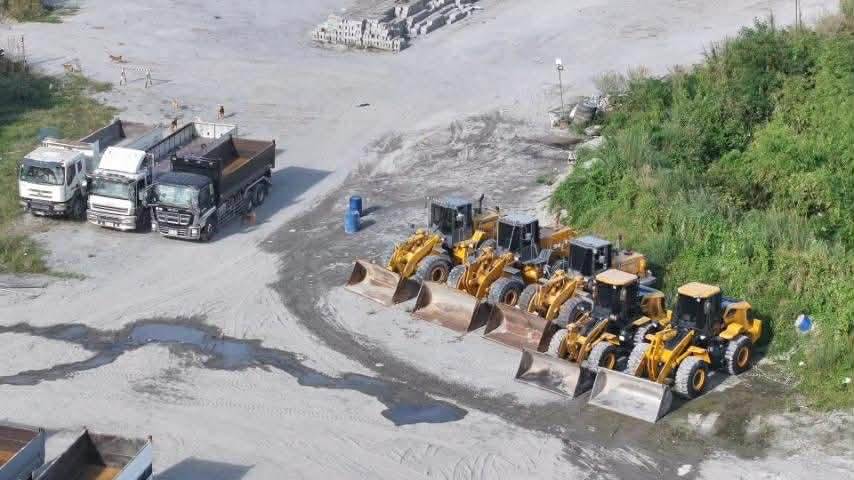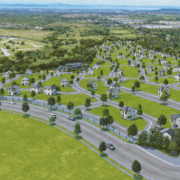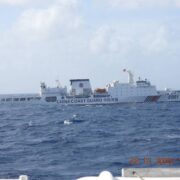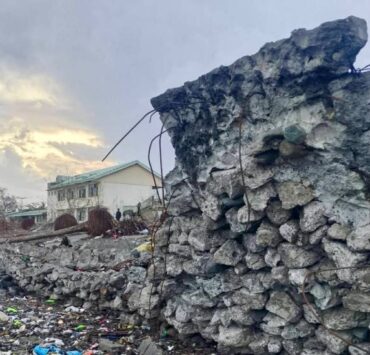Pampanga town sand quarry halted over tax hike

PORAC, PAMPANGA—The supplies of sand and gravel for the construction sector in Luzon are expected to drop as all 40 quarry operators and 850 haulers in this town, Pampanga’s biggest source of the aggregates, closed their sites since Friday night, and gave up at least P128 million of gross sales for two weeks in protest of alleged additional taxes and undue changes in policies and processes by the Porac municipal government.
The protest by the Association of Porac Sand and Gravel Quarry Operators Inc. is set to last two weeks, the group’s spokesperson Antonio Ayson said by phone on Saturday.
According to Ayson, quarry operators estimated a gross income loss of P38.2 million from selling lahar and screened sand (vibro), while haulers projected a gross income loss of P90 million over 15 days.
Also affected are some 60 “hustlers,” or men who help lead haulers to the source of good sand. So do 12 gasoline stations, 10 vulcanizing and repair shops and 20 roadside eateries.
Makers of stone-washed denims, bonsai and other items made of pumice stones rely on Porac supplies.
The quarry industry in Pampanga boomed following Mt. Pinatubo’s June 15, 1991, eruption and lahar flows until 1997, with discharges draining mainly to the Pasig-Potrero River, industry leaders reckoned.
In Porac’s 170 hectares of quarry sites, small-scale operators mine aggregates from a maximum of four hectares each, while holders of national permits conduct their quarrying activities in larger areas on private lands and river beds located far from public infrastructures.
Between 1,500 and 2,000 trucks of sand are hauled out of Porac daily except on Sundays, Ayson said, adding that the town contributes around 50 percent of the total provincial output of sand.
Commercial sand is also obtained from Santo Tomas, Bacolor, Minalin, Santa Rita, Floridablanca, Mabalacat City, Magalang and Angeles City.
Harassment
In a statement dated Nov. 21 and posted on their social media page the next day, the group referred to the “harassment by the local executive,” especially in the issuance of a municipal clearance for their operations.
Porac Mayor Jing Capil did not reply to calls and text messages from the Inquirer.
The group decried the “excessive and unjust tax” of P100 for management and ecological fees that it considered “double taxation.”
By law, the Pampanga provincial government already collects a sand fee of P150, an administrative fee of P250 and a weighing scale fee of P30, or a total of P430 per receipt paid by quarry operators and haulers at the provincial treasurer’s office, not at checkpoints. Loads with 12 cubic meters or less require one receipt, while loads with more than 12 cubic meters and up to 18 cubic meters. require two receipts, according to Romeo Dungca, head of the provincial quarry regulatory unit, Kalam.
These fees have been a major source of income for the provincial government, with total collections reaching P4.5 billion from July 2019 to May 2025.
Heavier terms
Dungca said local governments get proceeds from the P150 sand fee, which is distributed to the barangays, towns or cities and province at a 40-30-30 percent sharing set by the Local Government Code of 1991.
The group, in its statement, said it has complied with the local impositions for six years, but the terms have been “heavier” now.
Ayson said that on a maximum of 3,500 receipts per day from Porac, the provincial government could stand to lose P39.130 million in revenues per month from the receipts alone if the operators and haulers halt their operation over the same period.
Dungca said Gov. Lilia Pineda would be calling the parties to a dialogue, although the quarry group was planning to also sue the municipal government.

















